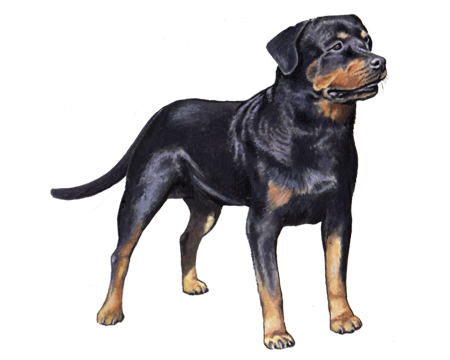
Rottweiler
The Rottweiler is a very intelligent breed that's trustworthy, strong, and loyal to its family. Rottweilers can be protective of their people and territory but are usually calm when they don't feel threatened. They make excellent watchdogs and loving companions.
Interested in discovering if your dog is a Rottweiler?
Check out Wisdom Panel's DNA tests.

Rottweiler Traits
General Appearance
Medium-large in size, the Rottweiler has a reputation for being a hearty, strong, working dog. The breed has an excessively stocky look, with a broad chest, long back, and thick legs.
Coat and Coloring
The short-haired coat of the Rottweiler is always black and accompanied by shades of tan, ranging from bright rust to dark mahogany. Rottweilers have a spot above each eye and on the sides of the muzzle. Their legs may also be marked.
Distinctive Physical Traits
Rottweilers have large, boxy heads, almond-shaped eyes, and powerful, thick necks. The breed's heavily muscled hind legs support its solid body. Their paws are large and heavy, and their ears fold down to a triangular shape.
Rottweiler Temperament
Rottweilers are calm, intelligent, and hard-working dogs. They make devoted companions and alert, protective, house dogs. A playful breed, they're also usually good with children.
Rottweilers are good guardians but have the reputation of being dominant and a bit territorial. They can be somewhat cautious with strangers—though they aren't big on barking.
They're an active breed that enjoys playing and having a job to do. Despite what some may assume, Rottweilers can be very gentle and loving dogs, particularly their families.


Rottweiler History
The Rottweiler breed dates back to the early Roman Empire. Roman cattle dogs traveled alongside Roman troops, herding the cattle that the soldiers used for food. They made their way through Europe and Germany and eventually stopped in the town of Rottweil. Rottweil became a cattle area, and the descendants of the Roman cattle dogs—now known as Rottweilers—protected the herds.
Rottweilers made excellent working dogs. They pulled carts, herded and protected cattle, and hunted boar. But by the end of the 19th century, the breed was virtually extinct—only one female remained in the entire town of Rottweil. Luckily, a Rottweiler club was founded in Germany in 1907, and the breed survived.
When there was a need for police dogs before World War I, Rottweilers were picked for the job. They were ideally suited for the work thanks to their strength, intelligence, and ability to follow directions.
The American Kennel Club officially recognized Rottweilers—affectionately called "Rotties"—in 1931.
Rottweiler Care
Nutrition
Rottweilers require a high-quality dog food that's age-appropriate—whether it's commercially made or prepared at home with guidance and approval from a veterinarian.
It's important to monitor the amount of food you feed your Rottweiler. Reduce portions if your pup gains weight, or cut back on treats—too many snacks on top of regular meals can cause obesity.
Grooming
Rottweilers require weekly brushing and regular baths. For most of the year, shedding is very moderate—though it will be more substantial in the spring and fall.
Weekly nail trims and regular at-home dental care—including teeth brushing—are ideal for this breed.
Exercise
Though not necessarily energetic, Rottweilers are strong, athletic dogs that need a reasonable amount of daily exercise. Dog sports such as agility, tracking, herding, and obedience are all activities that the breed enjoys. Brisk walks, hikes, games of fetch, and even swimming are all good ways to wear out your pup.
Training
Rottweilers were bred to guard people and property. Firm and structured training will help temper their instinct to guard and help them be safe household companions.
Early socialization with people and animals will help them become well-adjusted adult dogs. Because Rottweilers are a sensitive breed, they respond best to reward-based training using treats or favorite toys.
Raised properly, Rottweilers can be relaxed, self-assured, and brave—but not overly aggressive. However, it's important not to engage in rough play with this breed, as it may encourage undesirable behaviors.

Rottweiler Genetic Health Conditions
-
Hereditary Calcium Oxalate Urolithiasis, Type 1
Hereditary Calcium Oxalate Urolithiasis, Type 1 (CaOx1) is a genetic disorder that greatly increases the risk for urinary stones composed of calcium oxalate to form within the kidneys or bladder.
-
Sensorineural Deafness (Discovered in the Rottweiler)
Sensorineural Deafness is a disorder characterized by hearing loss in both ears by the time an affected dog is a few months of age. The associated genetic variant has been identified in the Rottweiler.
-
Juvenile Laryngeal Paralysis and Polyneuropathy
Juvenile laryngeal paralysis and polyneuropathy (JLPP) causes difficulty breathing and swallowing due to voice box (larynx) paralysis.
-
Myotubular Myopathy
Myotubular Myopathy is a disorder that affects the muscle cells. This starts with an early-onset hind limb weakness, progressing to an inability to move.
-
Neuroaxonal Dystrophy (Discovered in the Rottweiler)
Neuroaxonal dystrophy is a neurodegenerative disorder causing uncoordinated movement and gait (walking/running pattern) changes.
-
Palmoplantar Hyperkeratosis (Discovered in the Rottweiler)
Palmoplantar Hyperkeratosis is an inherited skin disorder characterized by hard, thickened, and cracked paw pads. Affected dogs also have an increased predisposition for skin allergies and recurrent skin and ear infections. The associated genetic variant has been identified in the Rottweiler.
Knowing if your Rottweiler is a carrier or at-risk for these conditions can help you and your veterinarian plan for your pup’s lifelong care. With Wisdom Panel™ Premium, you can get results for over 200 genetic health tests.
Breed Group
Guard
Dogs of the Guard Group were bred to guard people and property. They are often quick to learn and these intelligent, capable animals make solid companions.
Resources
https://www.akc.org/dog-breeds/rottweiler/
https://vcahospitals.com/know-your-pet/dog-breeds/rottweiler
Reviewed July 26, 2020 by Annette Louviere, DVM


































